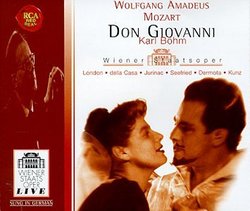| All Artists: Karl Bohm, George London, Erich Kunz, Lisa Della Casa, Irmgard Seefried, Anton Dermota, Ludwig Weber, Sena Jurinac, Walter Berry, Wiener Staatsopernchor und Orchester Title: Wiener Staatsoper Live - Mozart: Don Giovanni / London, della Casa, et al Members Wishing: 0 Total Copies: 0 Label: RCA Original Release Date: 1/1/1955 Re-Release Date: 11/24/1998 Genre: Classical Styles: Opera & Classical Vocal, Historical Periods, Classical (c.1770-1830) Number of Discs: 3 SwapaCD Credits: 3 UPC: 743215773726 |
Search - Karl Bohm, George London, Erich Kunz :: Wiener Staatsoper Live - Mozart: Don Giovanni / London, della Casa, et al
 | Karl Bohm, George London, Erich Kunz Wiener Staatsoper Live - Mozart: Don Giovanni / London, della Casa, et al Genre: Classical
Mozart called Don Giovanni a dramma giocoso, which might be translated as "serious comedy." Karl Böhm emphasizes its seriousness--understandably, since Don G. is dragged down to Hell, alive and screaming, in the last ... more » |
Larger Image |
CD Details
Synopsis
Amazon.com
Mozart called Don Giovanni a dramma giocoso, which might be translated as "serious comedy." Karl Böhm emphasizes its seriousness--understandably, since Don G. is dragged down to Hell, alive and screaming, in the last scene. George London, too, underplays comedy; his Byronic Don is essentially a 19th-century interpretation. Mozart treated the Don's horrible punishment as a happy ending; despite diabolical charm, he was a menace to society. An interpretation with a lighter touch, and one sung in Italian rather than a German translation, will be most people's first choice, particularly since no libretto is supplied. But this performance will appeal to those who speak German or who know the opera well. It was recorded live in 1955 at the reopening of the war-damaged Vienna Staatsoper; a dream cast was assembled for the occasion, and much of the singing is spectacularly good. Erich Kunz, a perennial favorite with Viennese audiences, is not otherwise available in the role of Leporello. --Joe McLellan

 Track Listings (20) - Disc #1
Track Listings (20) - Disc #1